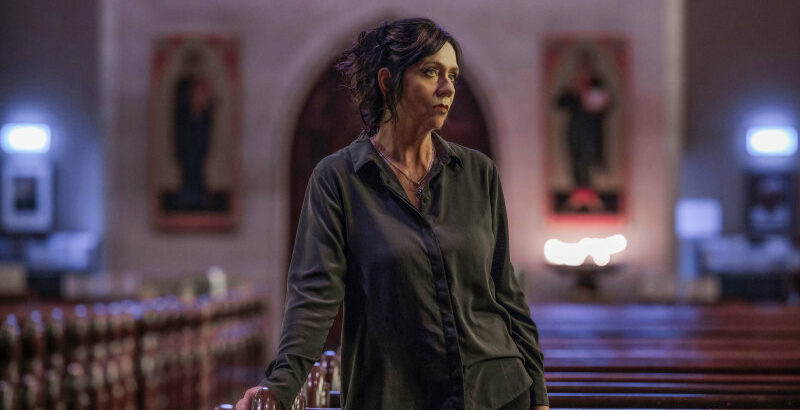Save articles for later
Add articles to your saved list and come back to them any time.
The link between music and spiritual belief is about as old as humanity, readily apparent in the rich centuries-old liturgical tradition of the Catholic Church.
This profound history has inspired noted Australian composer Mary Finsterer, whose third work as the 2023 composer-in-residence for the Melbourne Symphony Orchestra receives its world premiere at St Patrick’s Cathedral on Wednesday.
MSO composer-in-residence Mary Finsterer.Credit: Dean Golja
Finsterer has curated a concert based on the adoration of the Virgin Mary that culminates in her new work for orchestra and soprano, Ad Honorem Beatae Mariae Virginis & Stabat Mater.
“There are so many riches within the tradition of sacred music in the Western art tradition, and specifically within the tradition of the Catholic Church, because so many composers wrote for the church, and the church commissioned so many works over the centuries,” Finsterer says.
“There is much to learn for contemporary composers if they are interested in delving into this beautiful legacy. For me, it’s a joy because each day, I discover more.”
Finsterer has written a new setting to the Stabat Mater, the 800-year-old prayer to Mary, which she precedes with a section setting three other much-loved traditional prayers: Sub Tuum Praesidium, Ave Maria and Salve Regina, plus two verses from Psalm 82. Then the 20 verses of the Stabat Mater, about the grieving mother at the Cross, is divided into three movements.
The pre-recorded narration is by the deeply religious Catholic actor Mel Gibson, whom Finsterer flew to Los Angeles to meet. “I’m very grateful to him. The narration had to be by somebody who had an understanding of the meaning, the origins of these beautiful prayers, the legacy, tradition and profundity and knew how to deliver them through this polished voice with so much depth.”
Finsterer is a devout Catholic who feels particularly connected to the ancient Latin Mass, rarely used in Catholic churches since the reforming 1960s Second Vatican Council preferred Mass to be held in the local language.
Devout Catholic composer Mary Finsterer feels a close connection to Latin Mass.Credit: Dean Golja
She grew up in a strong conservative tradition, particularly through her Irish mother’s side, at a time of turmoil after Vatican II. Her connection deepened, she says, when she first became a mother around the time her father died.
“It lends itself to questions about one’s relationship with one’s faith, and about the relationship between life and death, and I think the purpose of life itself is to question those things and hopefully be guided by insight.
“The wonderful thing about getting older, if we have the privilege to grow older, is the challenge and the joy of insight because it’s within the search of finding meaning that we have the opportunity to deepen our faith and our resolve.”
Finsterer takes joy in the connections across space and time that sacred music grants her, where the ideas work with a single purpose. In this case, she says: “It is to honour Our Lady because this concert is in honour of the Blessed Virgin Mary, but it’s also in honour of God because she will always point us to our Lord, her purpose is to bring us closer to him.”
The other six works in the concert feature Gregorian chant and Renaissance and baroque works from the 16th to 18th centuries by Caterina Assandra, Grzegorz Gerwazy Gorczycki, Tomas Luis de Victoria, Michael Praetorius and Italian contemporary composer Mariano Garau.
Finsterer’s first composition for the MSO was Mysterium I, which opened the orchestra’s season at its gala concert, and will become one movement of a larger work. The second was a concertante for viola and orchestra, written for MSO principal violist Christopher Moore. She has found her time in residence a joyful experience.
The Stabat Mater shows Finsterer’s virtuosity, drawing on a range of inspirations, from motets and contrapuntal writing, and influences throughout the sacred tradition.
All her composing is driven by and is a work of faith, even if not specifically religious. And it is vital to her, she says, that she never stops learning. “We are all reminded every day of our mortality, but that’s not a reason to shy away from it. I hope I will embrace every opportunity to keep learning, and that’s what every day grants me.”
Stabat Mater premieres on Wednesday, September 27.
The Booklist is a weekly newsletter for book lovers from books editor Jason Steger. Get it every Friday.
Most Viewed in Culture
From our partners
Source: Read Full Article


